- Clone
- 22H9 (See other available formats)
- Regulatory Status
- RUO
- Other Names
- Thymic stromal lymphopoietin protein receptor, cytokine receptor-like 2, CRL2, CRLF2, IL-XR, TSLP-R
- Isotype
- Rat IgG2a, κ
- Ave. Rating
- Submit a Review
- Product Citations
- publications
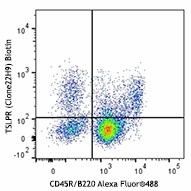
-

C57BL/6 bone marrow cells were stained with CD45R/B220 Alexa Fluor™488 and biotinylated TSLPR (clone 22H9 top) or rat IgG2a, κ isotype control (bottom), followed by Sav-PE. Data shown is gated on lymphoid population. -

| Cat # | Size | Price | Quantity Check Availability | Save | ||
|---|---|---|---|---|---|---|
| 151804 | 100 µg | 203€ | ||||
TSLP-R, also known as the thymic stromal lymphopoietin protein receptor, cytokine receptor-like 2, CRL2, and IL-XR, is a 40kD type I membrane receptor that forms a functional heterodimeric complex with IL-7R and binds with TSLP. TSLPR is required for proper protein folding and a box1 motif important for association with the JAKs. TSLP-R is expressed in myeloid cells, dendritic cells, B cells and activated monocytes. It is weakly expressed in T cells. Expression has also been reported in heart, skeletal, muscle, and kidney tissues. Ligand receptor interactions have been implicated in the development of the hematopoietic system, dendritic cell maturation, and the maintenance and polarization of human Th2 memory T cells in allergy diseases.
Product DetailsProduct Details
- Verified Reactivity
- Mouse
- Antibody Type
- Monoclonal
- Host Species
- Rat
- Immunogen
- TSLP Receptor Protein
- Formulation
- Phosphate-buffered solution, pH 7.2, containing 0.09% sodium azide.
- Preparation
- The antibody was purified by affinity chromatography and conjugated with biotin under optimal conditions.
- Concentration
- 0.5 mg/ml
- Storage & Handling
- The antibody solution should be stored undiluted between 2°C and 8°C. Do not freeze.
- Application
-
FC - Quality tested
- Recommended Usage
-
Each lot of this antibody is quality control tested by immunofluorescent staining with flow cytometric analysis. For flow cytometric staining, the suggested use of this reagent is ≤1.0 µg per million cells in 100 µl volume. It is recommended that the reagent be titrated for optimal performance for each application.
-
Application References
(PubMed link indicates BioLegend citation) -
- Isaksen DE, et al. 2002. J. Immunol. 168:3288. (FC)
- Bell BD, et al. 2013. Nat. Immunol. 14:364. (FC)
- Iseki M, et al. 2012. International Immunology 24:183. (FC)
- Astrakhan A, et al. 2007. Nature Immunology 8:522. (FC)
- Product Citations
-
- RRID
-
AB_2650790 (BioLegend Cat. No. 151804)
Antigen Details
- Structure
- Type I membrane receptor, forms functional heterodimeric complex with IL-7R to bind TSLP. Contains WSXWS motif required for proper protein folding and a box1 motif that is important for association with the JAKs.
- Distribution
- Expressed preferentially in myeloid cells including dendritic cells, B cells, activated monocytes, weakly expressed in T cells. Also expressed in heart, skeletal, muscle, and kidney cells.
- Function
- Binds to TSLP to stimulate cell proliferation.
- Ligand/Receptor
- TSLP.
- Cell Type
- Dendritic cells, B cells, Monocytes
- Biology Area
- Immunology
- Molecular Family
- Cytokine/Chemokine Receptors
- Antigen References
-
1. Reche PA, et al. 2001. J. Immunol. 167:336.
2. Tonozuka Y, et al. 2001. Cytogenet. Cell Genet. 93:23.
3. Zhang W, et al. 2001. Biochem. Biophys. Res. Commun. 281:878.
4. Wang YH, et al. 2006. Immunity 24:827. - Gene ID
- 57914 View all products for this Gene ID
- UniProt
- View information about TSLPR on UniProt.org
Related Pages & Pathways
Pages
Related FAQs
- How many biotin molecules are per antibody structure?
- We don't routinely measure the number of biotins with our antibody products but the number of biotin molecules range from 3-6 molecules per antibody.
Other Formats
View All TSLPR (TSLP-R) Reagents Request Custom Conjugation| Description | Clone | Applications |
|---|---|---|
| Purified anti-mouse TSLPR (TSLP-R) | 22H9 | FC |
| Biotin anti-mouse TSLPR (TSLP-R) | 22H9 | FC |
| APC anti-mouse TSLPR (TSLP-R) | 22H9 | FC |
| Brilliant Violet 421™ anti-mouse TSLPR (TSLP-R) | 22H9 | FC |
Customers Also Purchased
Compare Data Across All Formats
This data display is provided for general comparisons between formats.
Your actual data may vary due to variations in samples, target cells, instruments and their settings, staining conditions, and other factors.
If you need assistance with selecting the best format contact our expert technical support team.
-
Purified anti-mouse TSLPR (TSLP-R)
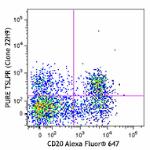
C57BL/6 bone marrow cells were stained with CD20 Alexa Fluor... 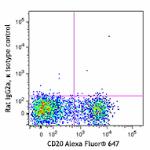
-
Biotin anti-mouse TSLPR (TSLP-R)
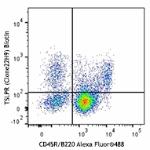
C57BL/6 bone marrow cells were stained with CD45R/B220 Alexa... 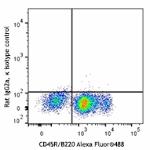
-
APC anti-mouse TSLPR (TSLP-R)
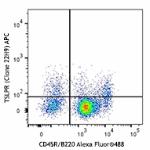
C57BL/6 bone marrow cells were stained with CD45R/B220 Alexa... 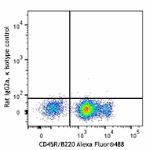
-
Brilliant Violet 421™ anti-mouse TSLPR (TSLP-R)
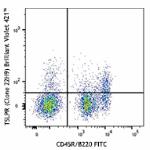
C57BL/6 bone marrow cells were stained with CD45R/B220 FITC ... 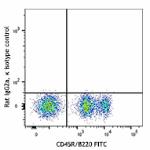

 Login / Register
Login / Register 







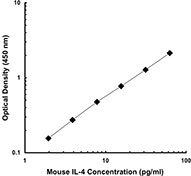
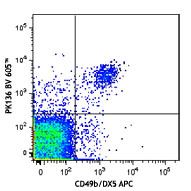
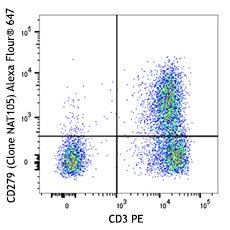



Follow Us